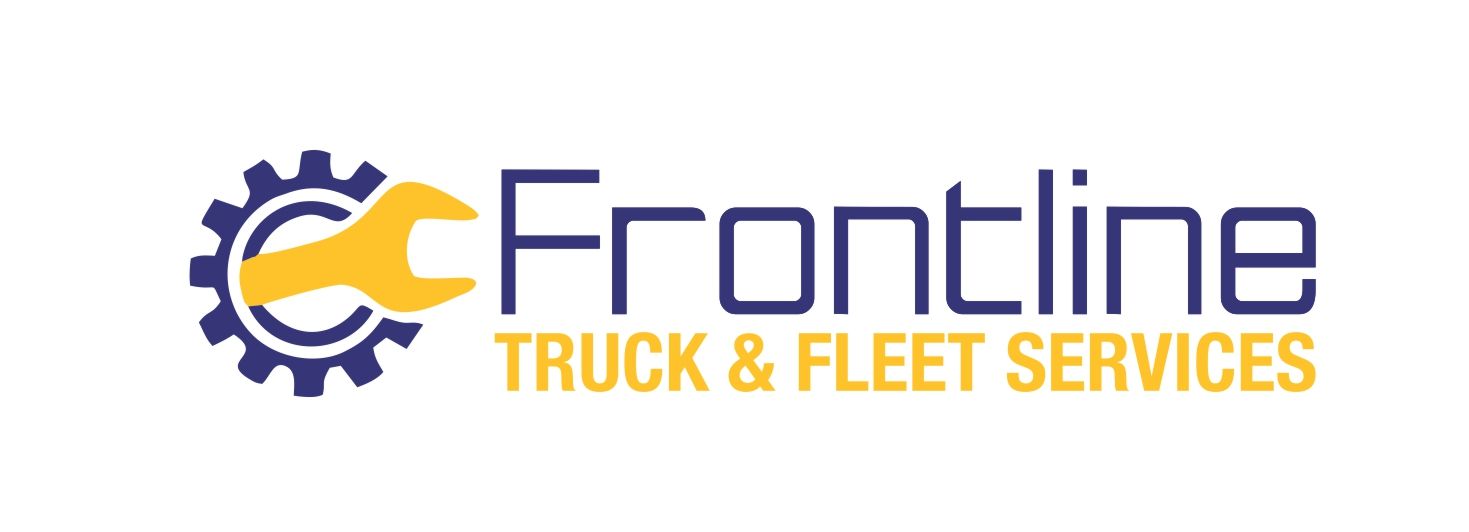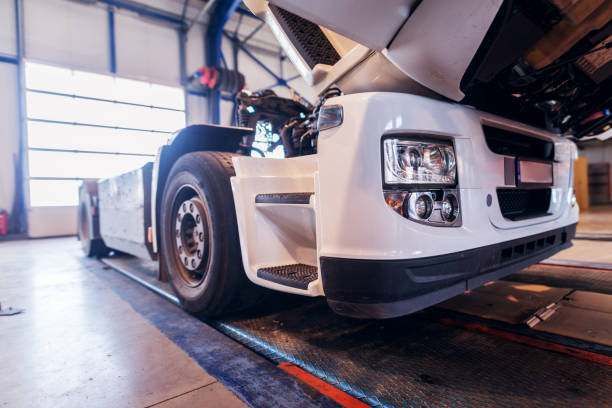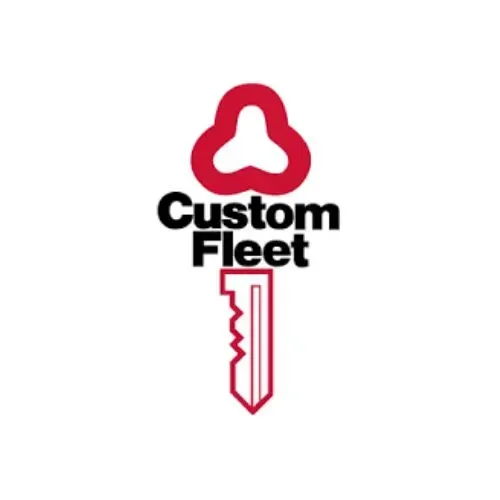"Call The Best , We'll Do The Rest"
Blog
Blog
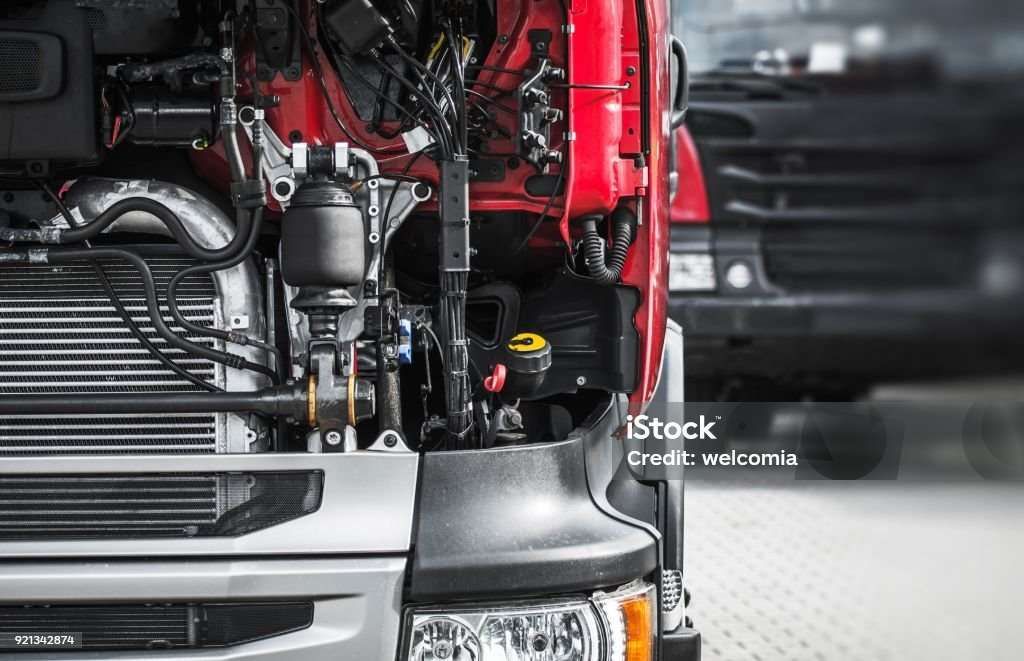
By Andy King
•
September 25, 2024
Truck breakdowns are an inevitable part of the transportation industry, impacting delivery schedules, increasing operational costs, and affecting overall economic efficiency. In a city like Perth, which serves as a crucial hub for both domestic and international freight, understanding where these breakdowns most commonly occur is essential. This article delves into the hotspots for truck breakdowns in Perth, supported by repair request statistics, road conditions, and traffic patterns. The Importance of Identifying Breakdown Hotspots For businesses that rely heavily on road freight, knowledge of breakdown hotspots is invaluable. It enables companies to: Optimise Route Planning : By avoiding areas prone to breakdowns, companies can reduce delays and improve delivery times. Enhance Risk Management : Understanding potential problem areas allows for better preparedness, such as arranging for backup vehicles or adjusting schedules. Improve Cost Efficiency : Minimising breakdowns can lead to significant savings on repair costs and reduce the risk of perishable goods spoiling. Collaborate with Service Providers : Aligning with truck repairs Perth services in strategic locations ensures quick response times when issues arise. Statistical Overview of Breakdown Locations While comprehensive public statistics on truck breakdowns in Perth are limited, data from transport agencies and industry reports highlight several key areas with higher incidences of breakdowns: Great Eastern Highway : Serving as a major artery connecting Perth to the eastern regions, this highway handles a significant volume of heavy vehicles daily. The constant heavy load contributes to road surface degradation, leading to increased wear and tear on trucks. Reports indicate that approximately 25% of truck breakdowns in the Perth area occur along this route. Kwinana Freeway : As one of the busiest freeways, it experiences heavy congestion, especially during morning and evening peak hours. The stop-start nature of traffic leads to mechanical stress. It's estimated that 18% of breakdown incidents happen on this freeway. Tonkin Highway Intersection Zones : The complexity of interchange designs, coupled with ongoing construction and upgrades, causes frequent stopping, gear shifting, and manoeuvring, which can lead to mechanical issues. Around 15% of reported breakdowns are associated with this area. Roe Highway : This key freight route sees a high volume of trucks transporting goods to and from industrial areas. The cumulative effect of heavy loads and high traffic volumes contributes to breakdowns. Port of Fremantle Access Roads : As the main port in Perth, the roads leading to and from Fremantle experience intense truck traffic. The combination of heavy loads and tight schedules can lead to mechanical failures. Factors Contributing to Breakdown Hotspots Road Conditions Surface Quality : Poor road surfaces with potholes, cracks, and uneven pavements can cause significant damage to tyres, suspension systems, and alignment. Maintenance Delays : Areas that lack regular maintenance see accelerated deterioration, increasing the risk of breakdowns. Construction Zones : Temporary road conditions due to construction can introduce hazards like sharp edges, loose gravel, and uneven lanes. Traffic Patterns Congestion : Prolonged idling in traffic jams leads to overheating engines and increased wear on braking systems due to frequent stopping. Accident Zones : Areas with high accident rates can cause sudden stops or detours, placing unexpected stress on vehicles. Variable Speed Limits : Fluctuating speed zones require constant acceleration and deceleration, contributing to mechanical strain. Weather Influences High Temperatures : Perth's summers often exceed 35°C (95°F), affecting tyre pressure and increasing the likelihood of blowouts. Engines are more prone to overheating under these conditions. Seasonal Rains : Sudden downpours can lead to slippery roads and reduced visibility, increasing the risk of accidents and mechanical issues due to water ingress. Wind Conditions : Strong winds, particularly in open areas, can make vehicle handling more difficult, affecting steering components and increasing fuel consumption. Vehicle Age and Maintenance Older Fleets : Trucks that are not regularly updated may lack modern features that prevent breakdowns. Maintenance Schedules : Infrequent servicing can lead to undetected issues that cause breakdowns on the road. The Role of Truck Repair Services in Perth Given the identified hotspots, truck repairs Perth services play a pivotal role in maintaining the efficiency of the transportation network. These services include: Strategically Located Workshops : Repair shops are often situated near major highways and industrial areas to reduce response times. Mobile Repair Units : Equipped to handle on-site repairs, these units can reach stranded trucks quickly, minimising downtime. 24/7 Emergency Services : Offering round-the-clock assistance to handle breakdowns at any time. Preventative Maintenance Programs : Working with companies to schedule regular servicing, thus reducing the likelihood of breakdowns. Advancements in Repair Services Diagnostic Technology : Modern repair services utilise advanced diagnostic tools to quickly identify and fix issues. Supply Chain Integration : Strong relationships with parts suppliers ensure that necessary components are available promptly. Skilled Technicians : Continuous training ensures that mechanics are up-to-date with the latest truck models and technologies. Preventative Measures To mitigate the risks associated with breakdown hotspots, several proactive strategies can be employed: Regular Maintenance Scheduled Servicing : Implementing a strict maintenance schedule based on mileage and time intervals. Pre-Trip Inspections : Drivers conducting checks before each journey to identify potential issues. Use of Quality Parts : Investing in high-quality components to enhance vehicle reliability. Route Planning Avoiding Peak Traffic : Scheduling deliveries during off-peak hours to minimise time spent in congested areas. Utilising Real-Time Data : Using GPS and traffic monitoring systems to adjust routes in response to current conditions. Alternative Routes : Planning secondary routes to bypass known construction zones or poor road conditions. Driver Training Mechanical Awareness : Training drivers to recognise early signs of mechanical problems. Efficient Driving Techniques : Teaching methods to reduce strain on the vehicle, such as smooth acceleration and braking. Emergency Procedures : Ensuring drivers know how to respond safely in the event of a breakdown. Technological Solutions Telematics Systems : Monitoring vehicle performance in real-time to detect issues before they lead to breakdowns. Automated Alerts : Setting up systems that notify maintenance teams when a vehicle requires attention. Fuel Management Systems : Optimising fuel usage to reduce engine stress. Impact on the Logistics Industry Truck breakdowns not only affect individual companies but also have broader implications for the logistics industry in Perth: Supply Chain Disruptions : Delays can have a ripple effect, impacting manufacturing schedules and inventory levels. Customer Satisfaction : Late deliveries can harm business relationships and reputations. Economic Costs : Increased operational costs due to repairs and delays can affect market prices and competitiveness. Collaboration with Authorities Working with local governments and transport authorities can lead to improvements in infrastructure and traffic management: Advocacy for Road Maintenance : Pushing for timely repairs and upgrades to problematic road sections. Infrastructure Development : Supporting projects that improve traffic flow, such as additional lanes or alternative routes. Safety Campaigns : Participating in initiatives to promote road safety and reduce accident rates. Conclusion Understanding where truck breakdowns commonly occur in Perth is crucial for the efficiency and reliability of the transportation industry. By analysing road conditions, traffic patterns, and environmental factors, companies can implement strategies to minimise risks. Collaboration with truck repairs Perth services ensures that when breakdowns do occur, they are resolved swiftly and effectively. Proactive measures, combined with technological advancements and strategic planning, can significantly reduce the incidence of breakdowns, keeping Perth's logistics network running smoothly and efficiently.
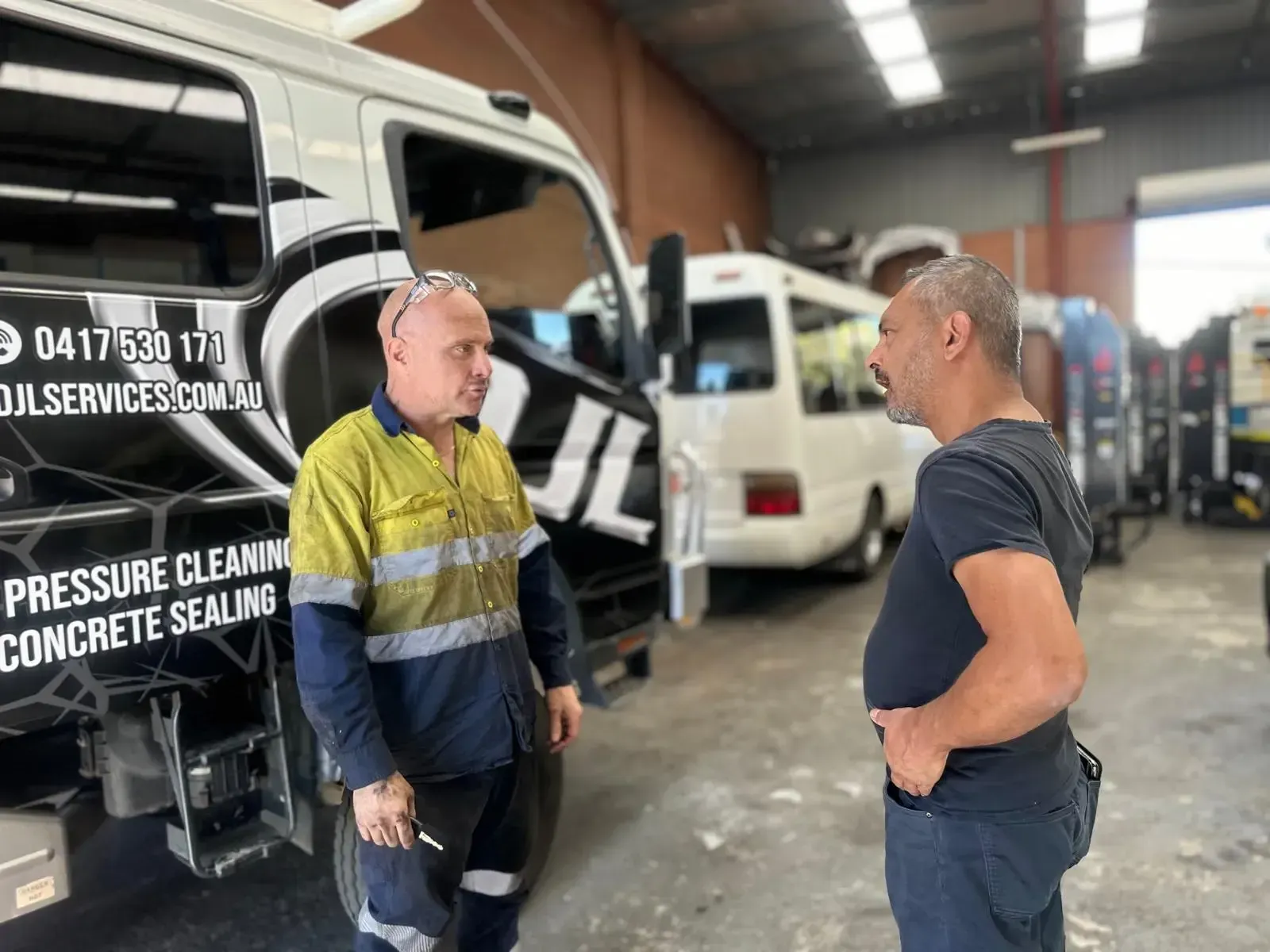
By Andy King
•
September 5, 2024
When it comes to maintaining the reliability and performance of heavy-duty trucks, the suspension system plays a crucial role. A faulty suspension can lead to compromised vehicle control, uneven tyre wear, and, ultimately, costly repairs. For businesses in need of truck repairs in Perth , understanding how to troubleshoot and address common suspension problems can save time and money, while ensuring trucks remain safe and roadworthy. In this article, we explore the technical approach to diagnosing and repairing issues with air springs, shock absorbers, and leaf spring systems, all critical components of heavy-duty truck suspensions. Identifying Air Spring Issues in Heavy-Duty Trucks Air springs, commonly found in heavy-duty trucks, provide a smoother ride and help distribute weight evenly across the axles. However, over time, air springs can develop leaks or suffer from pressure imbalances. Here’s how to troubleshoot common air spring issues: 1. Air Leaks Symptom: If the truck’s suspension feels less responsive, or if one side sits lower than the other, the air springs may be leaking. Diagnosis: Conduct a thorough inspection of the air springs for visible signs of wear, cracks, or punctures. Use a soapy water solution to spray on the air springs and fittings; bubbles forming around the suspension indicate a leak. Repair: Small punctures can sometimes be patched, but in most cases, replacing the damaged air spring is recommended to avoid further issues. 2. Compressor Failure Symptom: If the entire suspension system feels too soft, or the truck fails to maintain the desired ride height, the air compressor may be malfunctioning. Diagnosis: Use a pressure gauge to check the system’s air pressure. Low pressure indicates a compressor issue or a system blockage. Repair: Inspect the compressor for wear or electrical issues. If the compressor is not functioning, it may need to be replaced or rebuilt to restore normal air pressure to the system. Troubleshooting Shock Absorber Failures Shock absorbers are essential for controlling suspension movement and ensuring a smooth ride. Heavy-duty trucks rely on robust shocks to handle the stress of road conditions, but these components can wear out over time. Here’s how to identify and resolve shock absorber problems: 1. Oil Leaks from Shocks Symptom: Visible oil leaks around the shock absorbers and a noticeable decline in ride quality, including excessive bouncing, are signs of worn shocks. Diagnosis: Inspect the shocks for oil leakage. Shocks contain hydraulic fluid, and any signs of oil around the shocks indicate seal failure. Repair: Once shock absorbers start leaking, they lose their damping ability. Replacement is typically the most effective solution. 2. Worn Bushings Symptom: Knocking noises from the suspension, particularly when driving over rough terrain, may be caused by worn shock absorber bushings. Diagnosis: Check the bushings at the mounting points of the shocks. If they appear cracked or deteriorated, this could be causing noise and reduced stability. Repair: Replacing worn bushings will restore proper shock mounting and reduce noise, improving overall ride quality. 3. Excessive Bouncing or Swaying Symptom: If the truck bounces excessively after hitting a bump or sways more than usual, it’s likely the shocks have lost their damping power. Diagnosis: Perform a bounce test by pushing down on one corner of the truck. If the vehicle continues to bounce after releasing pressure, the shocks are likely worn. Repair: Replacement is the best course of action, as worn shocks cannot be repaired effectively. Diagnosing Leaf Spring Problems Leaf springs are critical for supporting the truck’s load and maintaining proper ride height. Heavy-duty trucks often use leaf springs in their rear suspension systems due to their durability. However, leaf springs can weaken or break under excessive stress. Here’s how to troubleshoot and repair common leaf spring issues: 1. Broken or Cracked Leaf Springs Symptom: A sagging suspension, uneven ride height, or loud clunking noises may indicate a broken leaf spring. Diagnosis: Conduct a visual inspection of the leaf springs for cracks or breaks. Pay attention to whether any leaves are separated or bent. Repair: Broken or cracked leaf springs must be replaced. Replacing the entire spring pack is often recommended to ensure balanced suspension performance. 2. Worn or Loose U-Bolts Symptom: Clunking noises and shifting of the rear axle during acceleration or deceleration can indicate loose or worn U-bolts. Diagnosis: Inspect the U-bolts that hold the leaf spring pack to the axle. If they appear loose or damaged, they may be causing instability. Repair: Retorque or replace U-bolts as necessary to secure the suspension and prevent further damage to the leaf springs. 3. Spring Eye Bushing Failure Symptom: Excessive play in the suspension and knocking sounds, particularly during cornering, may result from worn spring eye bushings. Diagnosis: Inspect the bushings at the ends of the leaf springs for signs of wear or damage. Repair: Replace worn or damaged bushings to restore proper suspension function and eliminate noise. Preventative Maintenance for Truck Suspensions Regular maintenance is key to preventing costly suspension repairs and ensuring optimal performance. For businesses seeking truck repairs in Perth , incorporating a routine suspension inspection into their maintenance schedule can help identify problems early. Key aspects of maintenance include: Checking air pressure in air springs regularly to ensure proper inflation. Inspecting shock absorbers for leaks and wear every 12 months or 50,000 km. Tightening U-bolts to maintain the integrity of the leaf spring system. By addressing suspension issues promptly, businesses can avoid more significant damage, reduce downtime, and extend the life of their trucks. Conclusion Troubleshooting suspension problems in heavy-duty trucks involves a thorough understanding of the system’s components, including air springs, shocks, and leaf springs. Whether it’s identifying air leaks, diagnosing shock absorber failure, or replacing damaged leaf springs, proper inspection and timely repair are crucial for maintaining a safe and smooth ride. For businesses requiring expert truck repairs in Perth , partnering with a skilled service provider can help ensure long-term reliability and minimise operational disruptions.
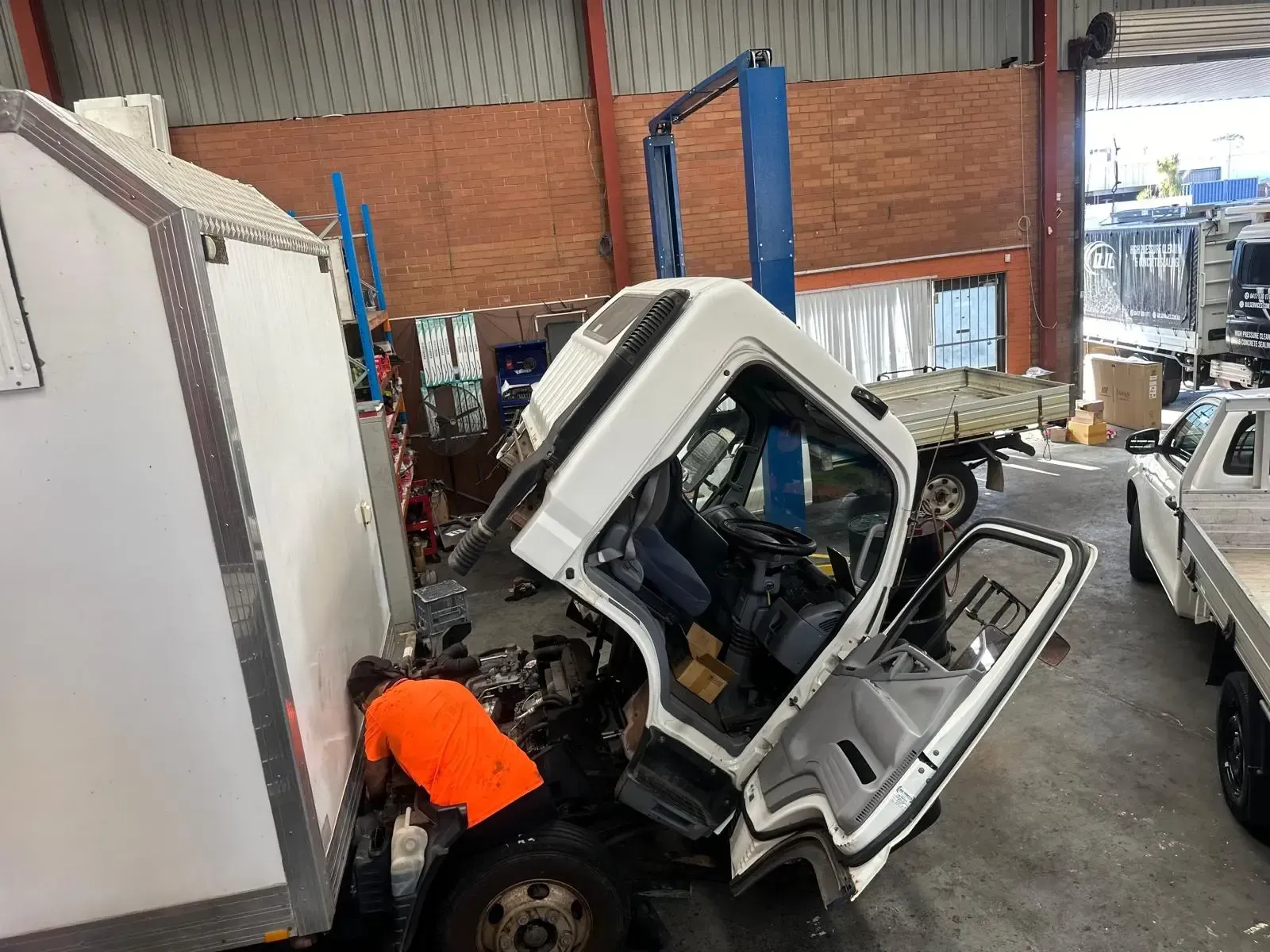
By Andy King
•
July 16, 2024
When it comes to heavy-duty vehicles like Mitsubishi trucks , maintaining a robust and reliable braking system is crucial. Brake repairs are not just about ensuring the longevity of your truck but also about guaranteeing the safety of drivers, cargo, and other road users. This article explores the significance of brake repairs for Mitsubishi trucks, common brake issues, and how to address them effectively. Importance of Brake Repairs for Mitsubishi Trucks Brakes are a critical component of any vehicle, and for Mitsubishi trucks, which often carry heavy loads and travel long distances, the importance of a well-maintained braking system cannot be overstated. Regular brake inspections and repairs help to: Ensure Safety Properly functioning brakes are essential to prevent accidents and ensure the safety of the driver and others on the road. Mitsubishi trucks often operate in demanding conditions, carrying heavy loads and traveling through varied terrains. A reliable braking system helps in avoiding collisions, especially in emergency situations where immediate stopping power is crucial. Regular brake maintenance ensures that the brakes respond effectively, reducing the risk of accidents and enhancing overall road safety. Improve Performance Well-maintained brakes enhance the overall performance of the truck, leading to smoother and more reliable operation. Effective braking is essential for maintaining control over the vehicle, particularly when navigating steep inclines or descents. Regular brake maintenance helps in preserving the truck’s handling characteristics, ensuring that it responds accurately to driver inputs. This is particularly important for commercial trucks that require consistent performance to meet delivery schedules and maintain operational efficiency. Extend Lifespan Regular maintenance and timely repairs can extend the lifespan of the braking system and the vehicle itself. Addressing minor issues before they escalate into major problems prevents excessive wear and tear on the brake components. This not only extends the life of the brakes but also reduces the overall stress on the vehicle’s drivetrain and suspension systems. By ensuring that all parts of the braking system are in good working condition, the truck's overall durability is enhanced, leading to a longer service life. Reduce Costs Addressing brake issues early can prevent more costly repairs down the line and minimize downtime for the truck. Preventive maintenance helps in identifying potential problems such as worn-out pads, damaged rotors, or leaking brake fluid before they cause significant damage. Timely repairs reduce the risk of brake failure, which can lead to expensive repairs and prolonged downtime. By investing in regular brake maintenance, fleet operators can save on repair costs and ensure that their trucks remain operational, thereby improving overall profitability. Common Brake Issues in Mitsubishi Trucks Mitsubishi trucks, like any other heavy-duty vehicles, can experience several common brake issues. Understanding these issues can help in identifying and addressing them promptly. Brake Pad Wear Brake pads are designed to wear out over time and need regular replacement. Signs of worn-out brake pads include: Squeaking or Grinding Noises: These noises indicate that the brake pads have worn down to the point where metal is contacting metal. Reduced Braking Performance: Worn-out brake pads result in longer stopping distances and decreased braking efficiency. Longer Stopping Distances: As the brake pads wear, they lose their ability to generate the necessary friction, leading to increased stopping distances. Brake Fluid Leaks Brake fluid is essential for the hydraulic operation of the brake system. Leaks can lead to a loss of braking power. Common signs include: Soft or Spongy Brake Pedal: This occurs when air enters the brake lines due to a fluid leak, reducing hydraulic pressure. Visible Fluid Leaks Under the Truck: Puddles of brake fluid under the vehicle are a clear indication of a leak. Warning Lights on the Dashboard: Modern trucks are equipped with sensors that detect low brake fluid levels and alert the driver. Rotor Damage Brake rotors can become warped or damaged due to excessive heat or wear. Symptoms include: Vibrations or Pulsations When Braking: Warped rotors cause the brake pads to make uneven contact, leading to vibrations. Uneven Braking Performance: Damaged rotors can result in inconsistent braking, with some areas of the rotor providing more friction than others. Visible Scoring or Grooves on the Rotor Surface: Physical inspection of the rotors may reveal deep grooves or scoring marks, indicating wear. ABS Malfunctions Mitsubishi trucks are equipped with Anti-lock Braking Systems (ABS) to prevent wheel lockup during emergency braking. Issues with the ABS can result in: ABS Warning Light on the Dashboard: This light indicates a problem with the ABS system, which may require diagnostic testing to identify. Loss of Traction Control: Faulty ABS can compromise the truck’s ability to maintain traction during braking, especially on slippery surfaces. Erratic Braking Behavior: Malfunctions in the ABS system can lead to unpredictable braking, such as premature or delayed activation of the ABS. Expert Tips for Maintaining Mitsubishi Truck Brakes Maintaining your Mitsubishi truck's braking system requires regular inspections and adherence to best practices. Here are some expert tips to ensure optimal brake performance: 1. Regular Inspections Schedule regular brake inspections to identify and address issues before they become major problems. This includes: Checking Brake Pads: Inspect for wear and thickness. Replace pads before they become too thin to ensure consistent braking power. Inspecting Rotors: Look for signs of warping, scoring, or uneven wear. Smooth rotors ensure better contact with brake pads. Assessing Fluid Levels: Ensure brake fluid is at the correct level and free from contaminants. Low or dirty fluid can compromise braking efficiency. Evaluating the ABS System: Regularly test the Anti-lock Braking System to ensure it activates properly during emergency braking situations. 2. Timely Replacements Replace brake pads and rotors as recommended by the manufacturer. Using high-quality replacement parts ensures better performance and longevity. Brake Pads: Opt for OEM (Original Equipment Manufacturer) or high-quality aftermarket pads that match the truck’s specifications. Inferior pads may wear out quickly or provide inadequate stopping power. Rotors: Choose rotors that meet or exceed OEM standards. High-quality rotors resist warping and provide smooth, consistent braking performance. Replacement Schedule: Follow the manufacturer’s guidelines for replacement intervals, which can vary based on driving conditions and usage patterns. 3. Fluid Maintenance Regularly check and top up brake fluid levels. Use the recommended type of brake fluid for your Mitsubishi truck and replace it periodically to maintain hydraulic efficiency. Brake Fluid Types: Mitsubishi trucks typically require DOT 3 or DOT 4 brake fluid. Always use the type specified in the owner’s manual. Fluid Replacement: Brake fluid absorbs moisture over time, which can reduce its boiling point and effectiveness. Regularly flushing and replacing the brake fluid helps maintain optimal hydraulic pressure and braking performance. Checking for Contaminants: Look for discolouration or debris in the brake fluid. Clean fluid is essential for the proper functioning of the braking system. 4. Monitor Brake Performance Pay attention to any changes in braking performance, such as unusual noises, vibrations, or reduced braking efficiency. Addressing these issues promptly can prevent further damage. Unusual Noises: Squeaking, grinding, or clicking sounds when braking may indicate worn-out pads or other issues. Vibrations: If you feel vibrations or pulsations through the brake pedal, it could be a sign of warped rotors or uneven pad wear. Brake Response: Notice any changes in how the brakes feel, such as a spongy pedal, increased stopping distance, or delayed response. These symptoms should be addressed immediately to prevent accidents. 5. Professional Servicing Engage a professional mechanic or service centre specializing in Mitsubishi trucks for any brake repairs or maintenance. Expert technicians have the knowledge and tools to handle complex brake issues effectively. Expert Diagnosis: Professional mechanics can accurately diagnose brake issues that might not be evident during a routine inspection. Specialized Tools: Mechanics use specialized equipment to test and repair brake systems, ensuring that all components work together seamlessly. Quality Assurance: Service centres typically guarantee their work, providing peace of mind that repairs are performed correctly and safely. Additional Tips Driving Habits: Encourage drivers to adopt gentle braking habits to reduce wear on brake pads and rotors. Avoid sudden stops and heavy braking whenever possible. Load Management: Properly manage the load on the truck to avoid overloading, which can put excessive strain on the braking system. Record Keeping: Maintain detailed records of all brake inspections, repairs, and replacements. This helps in tracking the condition of the braking system and planning future maintenance. Conclusion Maintaining the braking system of your Mitsubishi truck is essential for safety, performance, and cost-efficiency. Regular inspections, timely repairs, and adherence to expert maintenance tips can ensure that your truck's brakes remain reliable and effective. By prioritizing brake maintenance, you can enhance the longevity of your vehicle and ensure the safety of all road users. For the best brake repair and replacement services in Perth, trust Balcatta Truck Repairs . Our expert technicians are dedicated to keeping your Mitsubishi truck's braking system in top condition, providing you with peace of mind and reliable performance on the road.
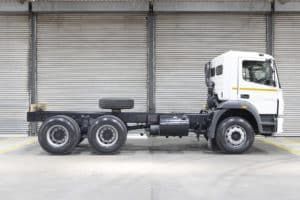
By Andy King
•
July 10, 2024
Maintaining and repairing trucks requires specialised knowledge and skills tailored to the specific type of engine and vehicle systems involved. For truck owners and fleet managers, choosing the right mechanic can significantly impact the longevity, performance, and reliability of their vehicles. This article explores the critical differences between general truck mechanics and diesel truck mechanics, detailing their respective scopes of work, skills, training, and the diagnostic tools they use. By understanding these distinctions, you can make informed decisions to ensure your trucks receive the appropriate maintenance and repairs. Additionally, we highlight why Balcatta Truck Repairs is recognised as the best truck repair company in Perth, offering expert services for both gasoline and diesel engine trucks. General Truck Mechanic Scope of Work A general truck mechanic, often referred to as a light truck mechanic, is skilled in maintaining and repairing a variety of truck types, primarily those with gasoline engines. Their work typically includes: Routine Maintenance: Oil changes, tire rotations, brake inspections, and fluid level checks. Engine Repairs: Addressing issues with spark plugs, fuel injectors, and ignition systems. Electrical Systems: Troubleshooting and repairing wiring, battery issues, and lighting systems. Transmission and Drivetrain: Servicing automatic and manual transmissions, differentials, and drive shafts. Suspension and Steering: Repairing and replacing shock absorbers, struts, and steering components. Exhaust Systems: Fixing or replacing exhaust pipes, mufflers, and catalytic converters. Skills and Training General truck mechanics undergo training that covers a wide range of vehicle systems and components. They typically: Complete a general automotive technology program. Obtain certifications from organisations like the National Institute for Automotive Service Excellence (ASE). Gain experience through apprenticeships or on-the-job training in various automotive repair shops. Diesel Truck Mechanic Scope of Work A diesel truck mechanic, or diesel technician, specialises in maintaining and repairing trucks equipped with diesel engines. Their responsibilities are more focused and include: Engine Diagnostics: Using specialised tools to diagnose issues specific to diesel engines, such as fuel injection systems, turbochargers, and emission controls. Fuel Systems: Repairing and maintaining high-pressure fuel pumps, fuel injectors, and filtration systems unique to diesel engines. Heavy-Duty Systems: Working on components such as air brakes, hydraulic systems, and power take-off units. Performance Tuning: Optimising diesel engine performance for fuel efficiency, torque, and power. Emissions Testing: Ensuring compliance with environmental regulations specific to diesel engines, including testing and maintaining diesel particulate filters (DPFs) and selective catalytic reduction (SCR) systems. Cooling Systems: Maintaining and repairing intercoolers, radiators, and coolant systems designed for high-performance diesel engines. Skills and Training Diesel truck mechanics undergo more specialised training and certifications to handle the complexities of diesel engines and heavy-duty systems. They typically: Complete a diesel technology program at a vocational school or community college. Obtain certifications specific to diesel engines and heavy-duty vehicles from organisations like ASE. Participate in ongoing training to stay current with advances in diesel technology and emission standards. Key Differences Engine Type General Truck Mechanics: Primarily work on gasoline engines, which have different combustion processes and components compared to diesel engines. Gasoline engines use spark ignition to ignite the air-fuel mixture, requiring mechanics to be adept at handling components such as spark plugs, ignition coils, and distributors. These engines typically operate at lower compression ratios and have different fuel delivery systems, such as carburetors or port fuel injection, which are less complex than the high-pressure systems found in diesel engines. Diesel Truck Mechanics: Specialise in diesel engines, which require knowledge of higher compression ratios, turbocharging, and specific fuel injection systems. Diesel engines use compression ignition, where the air is compressed to a high pressure and temperature, causing the fuel to ignite spontaneously. This process requires mechanics to understand and service components like fuel injectors, high-pressure fuel pumps, turbochargers, and intercoolers. Diesel engines are known for their durability and efficiency in heavy-duty applications, demanding a deep understanding of their robust construction and performance characteristics. Systems and Components General Truck Mechanics: Focus on lighter, more common vehicle systems such as standard brakes, electrical systems, and gasoline fuel systems. These systems are designed for lighter-duty vehicles and involve working with components like disc and drum brakes, conventional suspensions, and standard electrical systems. Mechanics need to be proficient in diagnosing and repairing issues related to these systems, which are generally simpler and more straightforward compared to those in heavy-duty trucks. Diesel Truck Mechanics: Deal with more robust and complex systems including air brakes, heavy-duty suspension, and advanced emission controls. Heavy-duty trucks often use air brake systems, which require specialised knowledge of air compressors, valves, and brake chambers. The suspension systems in these vehicles are designed to handle greater loads and include components such as leaf springs, airbags, and heavy-duty shock absorbers. Additionally, diesel truck mechanics must be familiar with advanced emission control systems like Diesel Particulate Filters (DPFs) and Selective Catalytic Reduction (SCR) systems, which are crucial for meeting stringent environmental regulations. Diagnostic Tools General Truck Mechanics: Use standard diagnostic tools for a broad range of vehicle types. These tools include OBD-II scanners, multimeters, and basic diagnostic software that can read and clear error codes, test electrical circuits, and perform general diagnostics on gasoline engines and light-duty vehicles. The tools are designed to interface with the simpler electronic systems found in these vehicles, making them versatile for a wide range of diagnostic tasks. Diesel Truck Mechanics: Utilise specialised diagnostic equipment tailored for diesel engines and heavy-duty trucks. These tools include advanced diagnostic software capable of interfacing with complex engine control modules (ECMs) and electronic control units (ECUs) found in diesel engines. Mechanics use tools like diesel scan tools, oscilloscopes for analysing electrical signals, and specific diagnostic equipment for fuel injection systems, turbochargers, and emissions controls. This equipment is essential for accurately diagnosing and repairing the intricate systems in diesel trucks. Training and Certifications General Truck Mechanics: Receive broader, less specialised training covering a variety of vehicle types. Their education typically involves completing a general automotive technology program that provides a comprehensive overview of vehicle systems and repair techniques. Certifications from organisations like the National Institute for Automotive Service Excellence (ASE) are common, covering various aspects of automotive repair. These mechanics gain practical experience through apprenticeships or on-the-job training in diverse automotive repair shops, allowing them to handle a wide range of repair and maintenance tasks on light-duty vehicles. Diesel Truck Mechanics: Undergo targeted training focusing on diesel technology and heavy-duty vehicle systems, often requiring more in-depth study and specific certifications. Their education involves completing specialised diesel technology programs at vocational schools or community colleges, where they learn about the intricacies of diesel engines, fuel systems, and heavy-duty truck components. Certifications specific to diesel engines and heavy-duty vehicles from organisations like ASE are essential, demonstrating their expertise in this specialised field. Ongoing training is also critical to stay current with advancements in diesel technology and emission regulations, ensuring they can effectively service and repair modern diesel trucks. Conclusion Choosing the right mechanic for your truck is crucial for its longevity and performance. General truck mechanics provide essential services for a wide range of truck types, primarily those with gasoline engines. In contrast, diesel truck mechanics offer specialised skills necessary for maintaining and repairing diesel engines and heavy-duty truck systems. Understanding these differences ensures that truck owners and fleet managers make informed decisions, ultimately leading to better vehicle maintenance and reduced downtime. For those in Perth seeking top-notch truck repair services, Balcatta Truck Repairs stands out as the best choice. Their team of experienced mechanics is equipped to handle both general and diesel truck repairs, ensuring your vehicle receives the expert care it needs to stay on the road longer and perform at its best.

By Andy King
•
July 1, 2024
Maintaining the performance and reliability of your Fuso truck is essential for ensuring its longevity and efficiency. At Balcatta Truck Repairs , we specialise in comprehensive repair and maintenance services tailored specifically for Fuso trucks . Our expertise covers critical components such as clutch, suspension, brakes, and radiator cooling systems, ensuring your vehicle remains in optimal condition. Understanding Fuso Trucks Fuso trucks , renowned for their durability and performance, are a popular choice in the commercial trucking industry. These vehicles are designed to handle heavy loads and demanding driving conditions, making them indispensable for businesses relying on efficient transportation. Fuso trucks are equipped with advanced technology and robust engineering, providing excellent fuel efficiency, reliability, and low emissions. Clutch Maintenance & Repairs The clutch system in a Fuso truck is vital for smooth gear transitions and overall vehicle performance. A malfunctioning clutch can lead to difficulties in gear shifting, reduced power transmission, and potential damage to the transmission system. At Balcatta Truck Repairs, we provide a comprehensive range of clutch maintenance and repair services: Clutch Inspections : Regular checks to identify wear and tear. We meticulously inspect the clutch disc, pressure plate, and release bearing for signs of damage or excessive wear. This preventative measure helps avoid sudden clutch failures that can lead to costly repairs and downtime. Clutch Adjustments : Ensuring proper engagement and disengagement. Proper clutch adjustment is crucial for maintaining smooth operation and preventing premature wear. Our technicians adjust the clutch linkage and pedal to manufacturer specifications, ensuring that the clutch operates within the correct range. Clutch Replacements : Using high-quality parts to restore optimal function. When replacement is necessary, we use only high-quality OEM (Original Equipment Manufacturer) parts to ensure durability and performance. Our experienced technicians handle the replacement process efficiently, minimising downtime and getting your Fuso truck back on the road swiftly. Suspension System Services The suspension system in Fuso trucks plays a crucial role in maintaining vehicle stability and comfort. It supports the weight of the truck and absorbs shocks from road irregularities. Our services include: Suspension Inspections : Assessing the condition of springs, shock absorbers, and linkages. Regular suspension inspections are essential for identifying worn or damaged components that can affect vehicle handling and safety. We thoroughly examine leaf springs, coil springs, shock absorbers, and suspension linkages to ensure they are in good condition. Suspension Repairs : Fixing issues related to alignment, worn-out parts, and leakage. Suspension repairs are critical for maintaining optimal vehicle performance. We address issues such as misalignment, worn bushings, and leaking shock absorbers, ensuring that your Fuso truck remains stable and comfortable on the road. Suspension Replacements : Installing durable components to enhance ride quality. When suspension components are beyond repair, we replace them with durable, high-quality parts designed to withstand the rigours of commercial use. Our replacements ensure enhanced ride quality and improved handling, contributing to the overall safety and comfort of your truck. Brake System Maintenance A well-maintained brake system is essential for the safety of your Fuso truck. Regular maintenance ensures effective braking performance, reducing the risk of accidents. Our brake services cover: Brake Inspections : Checking brake pads, rotors, and hydraulic systems. Regular brake inspections are crucial for identifying issues before they become serious problems. We inspect brake pads for wear, measure rotor thickness, and check the entire hydraulic system for leaks and proper operation. Brake Repairs : Addressing issues such as brake fluid leaks and worn-out pads. Timely brake repairs are vital for maintaining safety and performance. We handle a range of repairs, including replacing worn-out brake pads, resurfacing or replacing damaged rotors, and fixing hydraulic leaks to ensure reliable braking performance. Brake Replacements : Using high-grade parts to ensure reliable braking. When brake components need to be replaced, we use high-grade OEM parts to ensure longevity and reliability. Our replacements restore full braking capability, ensuring that your Fuso truck can stop safely and effectively in all conditions. Radiator Cooling System Services The radiator cooling system in Fuso trucks prevents the engine from overheating, which can cause severe damage. Regular maintenance of the cooling system is crucial for engine longevity. Our services include: Radiator Inspections : Checking for leaks, blockages, and corrosion. Regular inspections of the radiator and cooling system help identify potential issues such as leaks, blockages, and corrosion that can impede cooling efficiency. Our thorough inspections ensure that the cooling system operates effectively. Coolant Flushes : Replacing old coolant to maintain optimal engine temperature. Over time, coolant can degrade and lose its effectiveness. We perform coolant flushes to replace old, contaminated coolant with fresh fluid, ensuring that the engine maintains optimal temperature and prevents overheating. Radiator Repairs : Fixing leaks and replacing damaged components. When issues such as leaks or damaged components are identified, we provide prompt and effective repairs. Our technicians are skilled in fixing radiator leaks, replacing hoses, and ensuring that the cooling system functions properly to protect the engine. Radiator Cooling System Services The radiator cooling system in Fuso trucks prevents the engine from overheating, which can cause severe damage. Regular maintenance of the cooling system is crucial for engine longevity and optimal performance. Our comprehensive radiator cooling system services include: Radiator Inspections : Checking for leaks, blockages, and corrosion. Regular inspections are essential for identifying issues before they escalate. Our technicians conduct thorough checks for leaks in the radiator and hoses, blockages that could impede coolant flow, and signs of corrosion that could weaken the system. Early detection helps prevent costly repairs and ensures the cooling system operates efficiently. Coolant Flushes : Replacing old coolant to maintain optimal engine temperature. Over time, coolant can become contaminated with rust, scale, and other debris, reducing its effectiveness. We perform coolant flushes to remove old, degraded coolant and replace it with fresh, high-quality coolant. This service helps maintain the correct engine temperature, prevents overheating, and protects the engine from damage caused by extreme temperatures. Radiator Repairs : Fixing leaks and replacing damaged components. When issues are detected, prompt repairs are essential to maintain the cooling system's integrity. Our skilled technicians can repair leaks in the radiator and associated components, replace damaged hoses and clamps, and address any other issues that could compromise the system. We use high-quality replacement parts to ensure durability and reliable performance. Technical Information About Fuso Trucks Fuso trucks are engineered with cutting edge technology to meet the demands of modern transportation. They are designed to deliver exceptional performance, efficiency, and reliability. Key features of Fuso trucks include: Advanced Engine Technology : Fuso trucks are equipped with efficient and powerful engines that comply with stringent emission standards. These engines incorporate advanced fuel injection systems, turbocharging, and intercooling to optimise performance and fuel economy. The engines are designed to deliver high torque at low RPM, providing excellent power and drivability while maintaining fuel efficiency. Enhanced Safety Features : Fuso trucks come with advanced safety systems to protect drivers, passengers, and cargo. Key safety features include anti-lock braking systems (ABS), which prevent wheel lockup during emergency braking; electronic stability control (ESC), which helps maintain vehicle stability by detecting and reducing loss of traction; and lane departure warning (LDW), which alerts drivers if they unintentionally drift out of their lane. These features enhance overall safety and help prevent accidents. Durable Construction : Fuso trucks are built with robust chassis and high-strength materials, ensuring durability and longevity under heavy loads. The chassis is designed to withstand the rigours of daily use, with reinforced cross-members and high-strength steel components that provide structural integrity. This durable construction ensures that Fuso trucks can handle demanding applications and deliver reliable performance over the long term. Innovative Design : The ergonomic design of Fuso trucks provides improved driver comfort and accessibility, reducing fatigue during long hauls. The cabins are designed with driver-centric features, such as adjustable seats, intuitive controls, and ample storage space. The layout of the dashboard and instrumentation is designed for easy access and visibility, enhancing the driving experience. Additionally, the cabins are equipped with advanced climate control systems, providing a comfortable environment for drivers in all weather conditions. Conclusion At Balcatta Truck Repairs , we are dedicated to providing top tier repair and maintenance services for Fuso trucks. Our team of experienced technicians ensures that your truck's clutch, suspension, brakes, and radiator cooling systems are in excellent condition, promoting safety, performance, and reliability. Trust us to keep your Fuso truck running smoothly and efficiently, allowing you to focus on your business operations.
Our Affiliates

Email: service@balcattatruckrepairs.com.au
Phone: 08 9345 3122
MRB: 3829
